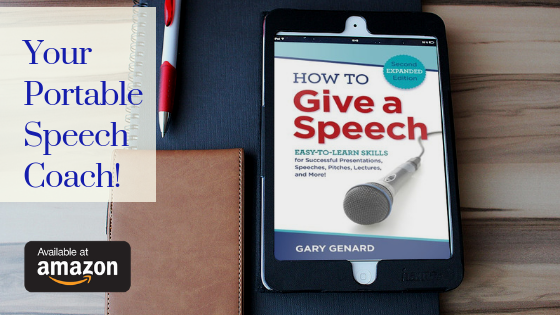 Want to improve on your success when pitching your ideas or products? Learn these 4 powerful ways to persuade a business audience.
Want to improve on your success when pitching your ideas or products? Learn these 4 powerful ways to persuade a business audience.
"I'm really good at the operational details of my job and understanding the data, but I'm terrible when it comes to persuading people."
That's not an unusual statement for a speech coach to hear from a client.
Is persuading hard-nosed business people really so hard? Well, yes.
For one thing, you need to get to the point and demand to be heard! Learn how with my Free resource, "How to Be a Clear, Concise, and Compelling Speaker."
This problem sits at the public speaking crossroads where just-deliver-the-content meets perform-your-presentation. Below are four ways to make it a lot more likely that you'll choose the right road.
1. Back Up What You Say With Evidence
It's easy to think that, once your audience has the information they need, they will make the right choice. But really, why should they? For one thing, they're not looking at things from inside your head as someone who knows your product inside-and-out.
They are disinterested. That doesn't mean "uninterested"—an important distinction. Audiences need more than your word that they should buy into what you are advocating or selling. Let's face it, you're not an unbiased source! Put it this way: a prospect for your idea or service needs more than just your word to go on.
Are you good at speaking virtually? Learn how to excel in virtual meetings! Get a Free chapter of my NEW book, The Online Meetings Handbook.
That means evidence. No matter how strongly you believe in what you're saying (more about that in a minute), you must back up every important assertion you make with something to prove that statement. In terms of organizing your speech, that means at least one form of strong evidence for each of your main points.
You have quite a buffet to choose from: personal anecdotes, experimental results, raw data, reports or official statements, white papers, case studies, client testimonials, industry trends, polls, expert testimony, news reports, and more. Get in the habit of accepting that your opinion or advocacy are not good enough. Produce the evidence!

2. Use Emotional Language
Next, use language that supports your cause. And that means the language of emotions.
When you're dealing with persuasion, you're squarely in the realm of emotions. In fact, neuroscientists now understand that all decisions have an emotional component. Do I have any evidence (per above) to support this assertion? How about this quote from a neuroscientist and co-author of a book entitled 30-Second Brain that cites clinical cases: "effective decision making is not possible without the motivation and meaning provided by emotional input." [1]
Learn more about speaking with presence! Get my Free Presenter's Guide, "4 Characteristics of an Influential Speaker."
Scientists have come to this conclusion by realizing that sufficient damage to the limbic system, which supports emotional responses, makes decision making impossible. In other words, even in analytical choices, decisions have an emotional component. For our purposes, it's a short step to enlisting the aid of emotions in persuading audiences.
If you believe that being emotional as a speaker is the key to unlocking listeners' emotional response, as an actor and speech coach I have two pieces of advice. First, your own emotional response can be helpful, as long as you find a balance and don't overdo it. Audiences can actually be more convinced if they believe that "there's more where that came from."
Second, use words that are custom-made to elicit emotional responses, rather than the dry "business-like" ones you may use out of habit. Think about your company's culture and your audience when choosing such words, of course. But even choices like "love" over "like"; "exciting" over interesting"; or "cutting-edge" over "new," prove the point.
3. Make Your Voice Persuasive
Your voice exceeds all of your other speaking tools when it comes to subtlety and nuance. We're all hard-wired to listen closely to the gradations in a person's voice.The truth is, very few business speakers use this tool effectively.
Here's how to make your voice boost your persuasion and influence! Download my Free Tips and Tricks Guide, "5 Ways to Improve Your Voice As a Professional."
There are specific techniques of voice and speech improvement training that a speech coach would work on with you (it's all personalized, of course). But here's the starting point: make your goal not adequately delivering your content, but reaching and moving your audience.
Naturally, you should do all the preparation that's essential for a solid speech or presentation. But when you're performing, try to have a conversation with listeners, as though you're getting something across to a friend who really needs to hear it. That's when your voice will start to sound like you.
Certain vocal techniques are fundamentally important. But here's your shortcut: tie your voice to what you're thinking and feeling. The human voice exists to express meaning to others and well as sheer information. So it's not enough for you to truly get what you're saying—you have to externalize what's inside you to others. That's your guiding star as you work on persuasion through the voice. Record yourself, asking, "Can my audience hear what I really mean from the sound of my voice?"
Here are those techniques I mentioned above: my Free cheat sheet on "The 5 Key Tools of Vocal Dynamics." Download it now!
4. Tell a Story . . . About Human Beings
You may think you need to be a better storyteller to persuade business audiences. And that could be true. But good storytelling in business may be less formal than you think, and probably easier.
Some storytelling advocates offer formulas and systems for you to adopt, involving archetypes or mythology or the "basic" elements of a story that are always repeated in some form or other. I think it's much easier than that. For me, storytelling as a speaker always comes down to presenting your data or arguments in terms of their impact on human beings. Does that involve drama and conflict and universal meaning and fulfillment, all the elements of good storytelling? You bet.
For instance, consider the insurance fraud investigator who gave a speech to staff members of aid agencies after a natural disaster. (Distribution of federal relief funds were part of the picture). She had much to say to her audience in terms of specifics. But she also spoke of their sacrifice and humanity in helping the flood victims. And she thanked them from the heart for what they had done. Afterwards, she told me that the listeners' response taught her something concerning how to connect with an audience.
That's an example of a story I slipped into this article to make my point. You can do the same thing anytime you want! Just remember: ultimately a story concerns what happened to, or will effect, the people involved. If you use your data and other information to weave together a narrative that answers that question, you'll indeed be an effective storyteller.
[1] Christian Jarrett, “The Neuroscience of Decision Making Explained in 30 Seconds.” https://www.wired.com/2014/03/neuroscience-decision-making-explained-30-seconds/
You should follow me on Twitter here.
SPEAK TO BE HEARD — 101 Powerful Speaking Tips! Click on the image below.
Gary Genard is an actor, author, and expert in public speaking training and overcoming speaking fear. His company, Boston-based The Genard Method offers live 1:1 Zoom executive coaching and corporate group training worldwide. In 2021 for the eighth consecutive year, Gary has been ranked by Global Gurus as One of the World’s Top 30 Communication Professionals. He is the author of the Amazon Best-Seller How to Give a Speech. His second book, Fearless Speaking, was named in 2019 as "One of the 100 Best Confidence Books of All Time." His latest book is The Online Meetings Handbook, now available at The Genard Method and at Amazon. To know more about TGM's services, Contact Gary here.






